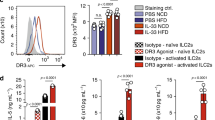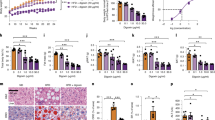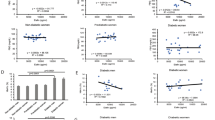Abstract
Background:
Immune processes contribute to the development of obesity and its complications, such as insulin resistance, type 2 diabetes mellitus and cardiovascular disease. Approaches that target the inflammatory response are promising therapeutic strategies for obesity. In this context, we recently demonstrated that the interaction between the costimulatory protein CD40 and its downstream adaptor protein tumor necrosis factor receptor-associated factor 6 (TRAF6) promotes adipose tissue inflammation, insulin resistance and hepatic steatosis in mice in the course of diet-induced obesity (DIO).
Methods:
Here we evaluated the effects of a small-molecule inhibitor (SMI) of the CD40-TRAF6 interaction, SMI 6860766, on the development of obesity and its complications in mice that were subjected to DIO.
Results:
Treatment with SMI 6860766 did not result in differences in weight gain, but improved glucose tolerance. Moreover, SMI 6860766 treatment reduced the amount of CD45+ leucocytes in the epididymal adipose tissue by 69%. Especially, the number of adipose tissue CD4+ and CD8+ T cells, as well as macrophages, was significantly decreased.
Conclusions:
Our results indicate that small-molecule-mediated inhibition of the CD40-TRAF6 interaction is a promising therapeutic strategy for the treatment of metabolic complications of obesity by improving glucose tolerance, by reducing the accumulation of immune cells to the adipose tissue and by skewing of the immune response towards a more anti-inflammatory profile.
This is a preview of subscription content, access via your institution
Access options
Subscribe to this journal
Receive 12 print issues and online access
$259.00 per year
only $21.58 per issue
Buy this article
- Purchase on Springer Link
- Instant access to full article PDF
Prices may be subject to local taxes which are calculated during checkout





Similar content being viewed by others
References
Kanneganti T-D, Dixit VD . Immunological complications of obesity. Nat Immunol 2012; 13: 707–712.
Wang YC, Colditz GA, Kuntz KM . Forecasting the obesity epidemic in the aging U.S. population. Obesity 2007; 15: 2855–2865.
Ferrante AW . The immune cells in adipose tissue. Diabetes Obes Metab 2013; 15: 34–38.
Winer S, Winer DA . The adaptive immune system as a fundamental regulator of adipose tissue inflammation and insulin resistance. Immunol Cell Biol 2012; 90: 755–762.
Anderson EK, Gutierrez DA, Hasty AH . Adipose tissue recruitment of leukocytes. Curr Opin Lipidol 2010; 21: 172–177.
Chatzigeorgiou A, Phieler J, Gebler J, Bornstein SR, Chavakis T . CD40L stimulates the crosstalk between adipocytes and inflammatory cells. Horm Metab Res 2013; 45: 741–747.
Ouchi N, Parker JL, Lugus JJ, Walsh K . Adipokines in inflammation and metabolic disease. Nat Rev Immunol 2011; 11: 85–97.
Surmi B, Hasty A . Macrophage infiltration into adipose tissue: initiation, propagation and remodeling. Fut Lipidol 2008; 3: 545–556.
Xu H, Barnes GT, Yang Q, Tan G, Yang D, Chou CJ et al. Chronic inflammation in fat plays a crucial role in the development of obesity-related insulin resistance. J Clin Invest 2003; 112: 1821–1830.
Seijkens T, Kusters P, Engel D, Lutgens E . CD40–CD40L: linking pancreatic, adipose tissue and vascular inflammation in type 2 diabetes and its complications. Diabetes Vasc Dis Res 2013; 10: 115–122.
Engel D, Seijkens T, Poggi M, Sanati M, Thevissen L, Beckers L et al. The immunobiology of CD154–CD40–TRAF interactions in atherosclerosis. Semin Immunol 2009; 21: 308–312.
Donners M, Beckers L, Lievens D, Munnix I, Heemskerk J, Janssen B et al. The CD40–TRAF6 axis is the key regulator of the CD40/CD40L system in neointima formation and arterial remodeling. Blood 2008; 111: 4596–4604.
Lutgens E, Lievens D, Beckers L, Wijnands E, Soehnlein O, Zernecke A et al. Deficient CD40-TRAF6 signaling in leukocytes prevents atherosclerosis by skewing the immune response toward an antiinflammatory profile. J Exp Med 2010; 207: 391–404.
Baena-Fustegueras JA, Pardina E, Balada E, Ferrer R, Catalán R, Rivero J et al. Soluble cd40 ligand in morbidly obese patients: effect of body mass index on recovery to normal levels after gastric bypass surgery. JAMA Surg 2013; 148: 151–156.
Poggi M, Engel D, Christ A, Beckers L, Wijnands E, Boon L et al. CD40L deficiency ameliorates adipose tissue inflammation and metabolic manifestations of obesity in mice. Arterioscler Thromb Vasc Biol 2011; 31: 2251–2260.
Poggi M, Jager J, Paulmyer-Lacroix O, Peiretti F, Gremeaux T, Verdier M et al. The inflammatory receptor CD40 is expressed on human adipocytes: contribution to crosstalk between lymphocytes and adipocytes. Diabetologia 2009; 52: 1152–1163.
Seijkens T, Kusters P, Chatzigeorgiou A, Chavakis T, Lutgens E . Immune cell crosstalk in obesity: a key role for co-stimulation? Diabetes 2014; 63: 3982–3991.
Guo C-A, Kogan S, Amano SU, Wang M, Dagdeviren S, Friedline RH et al. CD40 deficiency in mice exacerbates obesity-induced adipose tissue inflammation, hepatic steatosis, and insulin resistance. Am J Physiol Endocrinol Metab 2013; 304: 951–963.
Chatzigeorgiou A, Seijkens T, Zarzycka B, Engel D, Poggi M, van den Berg S et al. Blocking CD40-TRAF6 signaling is a therapeutic target in obesity-associated insulin resistance. Proc Natl Acad Sci USA 2014; 111: 2686–2691.
Wolf D, Jehle F, Michel NA, Bukosza EN, Rivera J, Chen YC et al. Coinhibitory suppression of T cell activation by CD40 protects against obesity and adipose tissue inflammation in mice. Circulation 2014; 129: 2414–2425.
Kawabe T . The immune responses in CD40-deficient mice: impaired immunoglobulin class switching and germinal center formation. Immunity 1994; 1: 167–178.
Ahonen C . The CD40-TRAF6 axis controls affinity maturation and the generation of long-lived plasma cells. Nat Immunol 2002; 3: 451–456.
Lafontan M . Adipose tissue and adipocyte dysregulation. Diabetes Metab 2014; 40: 16–28.
Osborn O, Olefsky JM . The cellular and signaling networks linking the immune system and metabolism in disease. Nat Med 2012; 18: 363–374.
Chmelar J, Chung KJ, Chavakis T . The role of innate immune cells in obese adipose tissue inflammation and development of insulin resistance. Thromb Haemost 2013; 109: 399–406.
Sell H, Habich C, Eckel J . Adaptive immunity in obesity and insulin resistance. Nat Rev Endocrinol 2012; 8: 709–716.
Wolf D, Jehle F, Ortiz Rodriguez A, Dufner B, Hoppe N, Colberg C et al. CD40L deficiency attenuates diet-induced adipose tissue inflammation by impairing immune cell accumulation and production of pathogenic IgG-antibodies. PLoS One 2012; 7: e33026.
Yi Z, Stunz L, Bishop G . CD40-mediated maintenance of immune homeostasis in the adipose tissue microenvironment. Diabetes 2014; 63: 2751–2760.
Zhong J, Rao X, Braunstein Z, Taylor A, Narula V, Hazey J et al. T-cell costimulation protects obesity-induced adipose inflammation and insulin resistance. Diabetes 2014; 63: 1289–1302.
Chatzigeorgiou A, Chung K-J, Garcia-Martin R, Alexaki V-I, Klotzsche-von Ameln A, Phieler J et al. Dual role of B7 costimulation in obesity-related non-alcoholic steatohepatitis (NASH) and metabolic dysregulation. Hepatology 2014; 60: 1196–1210.
Lagorce D, Sperandio O, Galons H, Miteva M, Villoutreix B . FAF-Drugs2: free ADME/tox filtering tool to assist drug discovery and chemical biology projects. BMC Bioinform 2008; 9: 396.
Miteva MA, Violas S, Montes M, Gomez D, Tuffery P, Villoutreix BO . FAF-Drugs: free ADME/tox filtering of compound collections. Nucleic Acids Res 2006; 34: W738–W744.
Nishimura S, Manabe I, Nagai R . Adipose tissue inflammation in obesity and metabolic syndrome. Discov Med 2009; 8: 55–60.
Acknowledgements
We acknowledge the support from the Netherlands CardioVascular Research Initiative: ‘the Dutch Heart Foundation, Dutch Federation of University Medical Centres, the Netherlands Organisation for Health Research and Development and the Royal Netherlands Academy of Sciences’ for the GENIUS project ‘Generating the best evidence-based pharmaceutical targets for atherosclerosis’ (CVON2011-19). This work was supported by the Netherlands Organization for Scientific Research (NWO)(VICI grant to EL, and CW, medium investment grant to GN), the Netherlands Heart Foundation (Established investigator grant to EL, MW, Dr E Dekker grant to TS), the Rembrandt foundation (SB, MW, EL), the Deutsche Forschungsgemeinschaft (DFG FOR809: LU1643/1-2, SO876/3-1, WE1913/11-2, SFB914-B08 and SFB 1054 and SFB-1123 to EL, CW, CH279/5-1 to TC), European Research Council Grants (No. 281296 to TC and ERC AdG No. 249929 to CW), a grant from the Else-Kroner-Fresenius-Stiftung (to TC) and by a grant from the German Federal Ministry of Education and Research to the German Center for Diabetes Research (DZD eV) (to TC) and DZHK (German Centre for Cardiovascular Research, MHA VD1.2 to CW), the Cardiovascular Research Institute Maastricht (to GN), the EU (Grant No. KBBE-2011-5 289350 to GN), the Transnational University Limburg (to GN) and Cyttron II (FES0908 to GN).
Author information
Authors and Affiliations
Corresponding author
Ethics declarations
Competing interests
The authors declare no conflict of interest.
Additional information
Supplementary Information accompanies this paper on International Journal of Obesity website
Supplementary information
Rights and permissions
About this article
Cite this article
van den Berg, S., Seijkens, T., Kusters, P. et al. Blocking CD40-TRAF6 interactions by small-molecule inhibitor 6860766 ameliorates the complications of diet-induced obesity in mice. Int J Obes 39, 782–790 (2015). https://doi.org/10.1038/ijo.2014.198
Received:
Revised:
Accepted:
Published:
Issue Date:
DOI: https://doi.org/10.1038/ijo.2014.198
This article is cited by
-
Inhibition of CD40-TRAF6-dependent inflammatory activity halts the onset of diabetic retinopathy in streptozotocin-diabetic mice
Nutrition & Diabetes (2022)
-
MiR-146a-5p targeting SMAD4 and TRAF6 inhibits adipogenensis through TGF-β and AKT/mTORC1 signal pathways in porcine intramuscular preadipocytes
Journal of Animal Science and Biotechnology (2021)
-
The CD40-CD40L Dyad as Immunotherapeutic Target in Cardiovascular Disease
Journal of Cardiovascular Translational Research (2021)
-
T cell co-stimulation and co-inhibition in cardiovascular disease: a double-edged sword
Nature Reviews Cardiology (2019)
-
TRAF Molecules in Inflammation and Inflammatory Diseases
Current Pharmacology Reports (2018)



